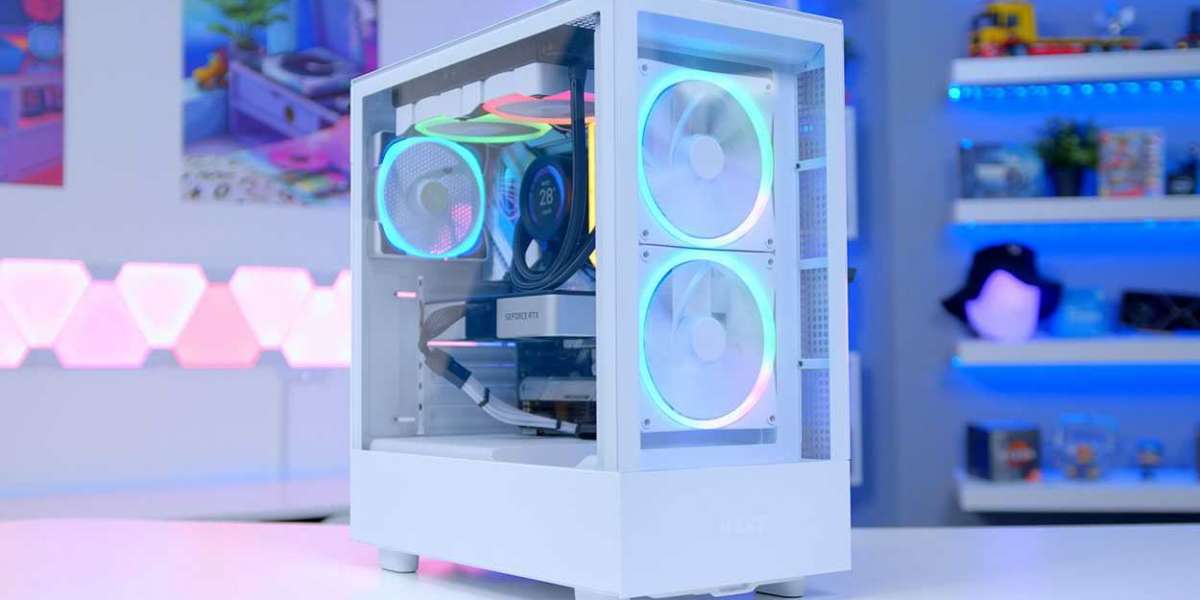In today’s fast-paced eCommerce world, standing out means offering something unique. For businesses selling PCs, a custom PC configurator is a powerful tool. It lets customers design their perfect system—whether it’s a high-performance workstation, a gaming powerhouse, or a design-focused rig—directly on your Shopify store, tailored to their needs and budget.
This blog post will go over the technical steps for establishing a custom PC configurator on Shopify, as well as instructions on how to create, operate, and deploy the tool. With a focus on developers and IT professionals, we'll go over how to make your PC configurator both technically sound and user-friendly.
What is a Custom PC Configurator?
A custom PC configurator is an online tool that allows users to build and personalize their own PCs according to specific requirements, such as processor speed, RAM size, storage capacity, graphics cards, and more. With such configurators, customers can visualize their ideal system in real-time and make informed decisions based on their unique preferences.
Integrating a PC configurator directly into their business is innovative for Shopify store owners in the gaming and custom PC industries. Offering a hands-on, interactive experience not only provides a consistent consumer experience, but also enhances engagement, minimizes cart abandonment, and boosts revenue.
Important Technical Factors to Take Into Account When Creating a Custom Shopify PC Configurator
1. Integration with Shopify Store
The first and most important technical aspect when integrating a custom PC configurator into your Shopify store is ensuring easy compatibility. Shopify, being a hosted solution, has numerous options for extending its functionality, including third-party apps, APIs, and custom code. The custom PC configurator should integrate seamlessly with Shopify's checkout system, allowing users to create their own unique PCs and add them directly to their cart for a simple purchase.
For developers, ensuring that the custom PC configurator integrates seamlessly with Shopify's backend is game-changing. Consider a consumer selecting their preferred components; each selection dynamically modifies inventory, pricing, and product information in real-time. By utilizing Shopify's APIs, you can provide a seamless, error-free experience while maintaining precise pricing and stock levels. This type of smart integration not only increases productivity but also develops trust with your consumers by ensuring they receive precisely what they want.
2. Customizing the User Interface (UI)
A great custom PC configurator isn’t just about functionality—it’s about creating an intuitive and enjoyable experience for your customers. The interface should be clean, responsive, and easy to navigate, guiding users effortlessly as they build their dream PC. Think dropdown menus, checkboxes, and real-time visual previews that showcase exactly what they’re selecting. For example, as a customer chooses a graphics card, the design could instantly update to reflect their choice, giving them a clear picture of their configuration.
To make this seamless, you can leverage tools like JavaScript, React, or Vue.js to handle real-time updates. This not only makes the process faster but also adds a layer of interactivity that keeps users engaged. A well-designed configurator isn’t just a tool; it’s an experience that empowers customers to bring their vision to life with confidence.
Additionally, using a WordPress book preview plugin as inspiration could help develop features that allow users to preview the entire system before purchase. This preview could include an interactive 3D model or a simple, detailed image of the final build.
3. Real-Time Pricing and Inventory Syncing
One of the biggest challenges in building a custom PC configurator is keeping prices and inventory updated in real-time. Imagine a customer selecting components for their dream setup—a high-end CPU or GPU would naturally raise the price while choosing more standard parts might lower it. The configurator needs to reflect these changes instantly to provide a smooth, transparent shopping experience.
This is where Shopify’s product variations come into play. By linking each component—like the motherboard, CPU, GPU, RAM, and storage—to its corresponding product in Shopify’s inventory system, you can automate pricing and stock updates. As customers select their parts, the configurator dynamically adjusts the price and ensures only in-stock items are displayed. It’s a seamless way to keep your customers informed while simplifying the backend management for your store.
Additionally, make sure that goods that are out of stock are marked so that customers can't order parts that aren't available. This may be accomplished by dynamically tracking the stock levels of every configurator component using Shopify's Inventory API.
4. Building Component Databases
Creating a robust component database is a key step in building a custom PC configurator. This database should house all the essential details about each product—features, compatibility, and pricing—so your customers can make informed decisions about their perfect build. Think of it as the backbone of your configurator, helping users weigh performance, compatibility, and budget with confidence.
If you’re working with a large inventory of parts from multiple manufacturers, consider organizing them into easy-to-navigate categories. For example, CPUs could be grouped by brand (Intel or AMD) or by purpose (gaming, workstation). This thoughtful classification system not only simplifies the browsing experience but also empowers customers to find exactly what they need without feeling overwhelmed. A well-structured database makes navigating even the largest inventories effortless, giving users a smoother and more enjoyable journey to building their dream PC.
5. Ensuring Compatibility Between Components
In custom PC designs, compatibility between different components is essential. For instance, a user can select a motherboard that is incompatible with the CPU they have selected or a power supply that is not enough to run the entire system. Developing compatibility tests is essential to your configurator's success.
Based on each component's characteristics, which may be compared to those of other chosen components, compatibility filters can be put into place. To guarantee that clients only choose components that will function together, choosing a particular motherboard, for instance, may automatically filter compatible processors, GPUs, and RAM.
Enhancing User Experience: Adding Value with Advanced Features
1. Build Saving and Sharing
Let your customers save and share their custom builds effortlessly. Whether they need time to decide or want to show off their setup to friends for feedback, this feature can make all the difference. By customizing Shopify apps like "Save for Later," you can allow users to securely store their entire builds, making the shopping experience more convenient and engaging.
2. 3D Visualization
One of the most engaging ways to showcase a custom PC setup is through 3D visualization. Imagine allowing your customers to see their build from every angle, interacting with it in real-time as they make changes. This immersive experience not only boosts their confidence in the choices they’re making but also elevates the entire shopping journey. By leveraging WebGL tools like Three.js, you can bring these 3D models to life right in the browser, offering a seamless and interactive way for customers to visualize their dream PC.
3. Expert Recommendations and Filters
Another valuable feature is offering expert recommendations to guide your customers. You can suggest pre-configured builds like "Best Gaming Setup" or "Affordable Workstation" based on their needs, or recommend the best components for specific tasks. This helps simplify the process for customers who might not be familiar with the technical details of building a PC, making their experience more intuitive and stress-free. By offering tailored advice, you not only enhance the user experience but also build trust with your customers.
Benefits of Implementing a Custom PC Configurator
Adding a custom PC configurator to your Shopify store brings a world of benefits. Not only does it create a personalized shopping experience that makes your customers feel more connected to their purchase, but it also boosts engagement. It allows customers to play an active role in building their dream PC, making the process more exciting and memorable. In addition to offering a customized purchasing experience and increasing client involvement, it can also:
- Increase Conversion Rates: When customers can create their perfect PC, they’re more likely to complete a purchase, as they feel more in control of the process.
- Reduce Cart Abandonment: A custom PC configurator helps users visualize their dream setup, making them less likely to leave their cart behind. It turns their ideas into something real and tangible.
- Differentiate Your Brand: Offering a unique customization experience gives your store a competitive edge. While others sell off-the-shelf PCs, you’re providing a personalized solution that speaks directly to each customer’s needs.
- Increase Average Order Value: With more customization options, customers often opt for higher-end components, raising the total value of each order. It’s a win for both the customer and your bottom line.
Conclusion
Building a custom PC configurator for your Shopify store is more than just an investment—it's a way to elevate your customers' experience and set your business up for success. By seamlessly integrating with your Shopify site, providing real-time pricing and inventory updates, and offering a smooth, intuitive design, you can create a tool that not only meets customer expectations but exceeds them. With the right approach and technical expertise, your custom PC configurator can become a powerful feature that drives engagement, boosts conversions, and helps you build lasting relationships with customers in the competitive world of custom PCs.
To maximize the potential of your custom PC configurator, it's essential to leverage professional Shopify Development Services. These services can help you tailor the configurator to fit seamlessly with your store's theme and functionality, ensuring an optimized shopping experience. With the expertise of skilled developers, your configurator can be built to handle complex configurations while maintaining the performance and scalability necessary for business growth.







